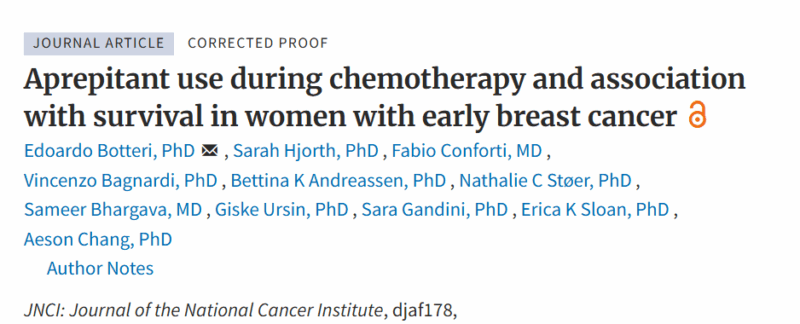
Miguel Bronchud: Can Use of Aprepitant During Chemotherapy Improve TNBC Outcomes?
Miguel Bronchud, Co-Founder and Advisory Board at Regenerative Medicine Solutions, shared a post on LinkedIn about recent article by Edoardo Botteri et al. on Journal of the National Cancer Institute:
“Can Use of Aprepitant During Chemotherapy Improve Triple-Negative Breast Cancer Outcomes?
This recently released ASCO post (American Society of Clinical Oncology) reminds us of several important issues:
1. We are all still so ignorant about cancer and particularly about often incurable or aggressive cancers (like many so-called Triple Negative Breast Cancers, TNBC, meaning breast cancers without any estrogen or progesterone receptors on their cells and no obvious over expression of the mutated oncogene HER-2) that we are still largely ignorant on how to cure them and what mechanisms can truly help to stop them.
2. Even if we ought to always take note of any therapeutic effects on incurable cancers, we should always conform to and respect basic principles on drug development like the need and importance of prospective phase III randomized studies before we come to drug approval or treatment recommendations.
3. At present, the growing complexity of treatment methods, including targeted therapy, immunotherapy, and advanced oral therapy, make it challenging for medical oncologists to stay current on treatment options across a wide variety of cancer types. The result is that subspecialization in medical oncology, in which oncologists focus on a narrow set of cancer types, is growing.
4. A retrospective cohort study examining trends in oncologist subspecialization and the differences in utilization of subspecialized cancer care in the United States has found that while subspecialization in oncology is increasing, it is unevenly distributed, with growing differences in utilization between high- and low-income areas and regions in the United States, despite higher cancer mortality rates in low-income areas.
These differences in utilization could reflect systematic barriers to care. The study by Karadakic et al was published in Annals of Internal Medicine. At present there are many breast cancers academic units with sub units specifically designed for women who suffer from various breast cancer subtypes- like Luminal types , HER-2 positive or rich, Hormone receptors positive but HER-2 negative; and Triple Negative Breast Cancer (TNBC).
All of these drug developments principles apply to recent sustained suspicion that Aprepitant, a commonly used antiemetic, led to improvements in patient outcomes when given during chemotherapy treatment for patients with non-luminal early breast cancer.
Patients showed better prognoses and survival advantages, particularly among those with triple-negative breast cancer. Study findings were published in the Journal of the National Cancer Institute.”
Title: Aprepitant use during chemotherapy and association with survival in women with early breast cancer
Authors: Edoardo Botteri, Sarah Hjorth, Fabio Conforti, Vincenzo Bagnardi, Bettina K Andreassen, Nathalie C Støer, Sameer Bhargava, Giske Ursin, Sara Gandini, Erica K Sloan, Aeson Chang,
Read Full Article in Journal of the National Cancer Institute.

More posts featuring Miguel Bronchud.
-
Challenging the Status Quo in Colorectal Cancer 2024
December 6-8, 2024
-
ESMO 2024 Congress
September 13-17, 2024
-
ASCO Annual Meeting
May 30 - June 4, 2024
-
Yvonne Award 2024
May 31, 2024
-
OncoThon 2024, Online
Feb. 15, 2024
-
Global Summit on War & Cancer 2023, Online
Dec. 14-16, 2023
